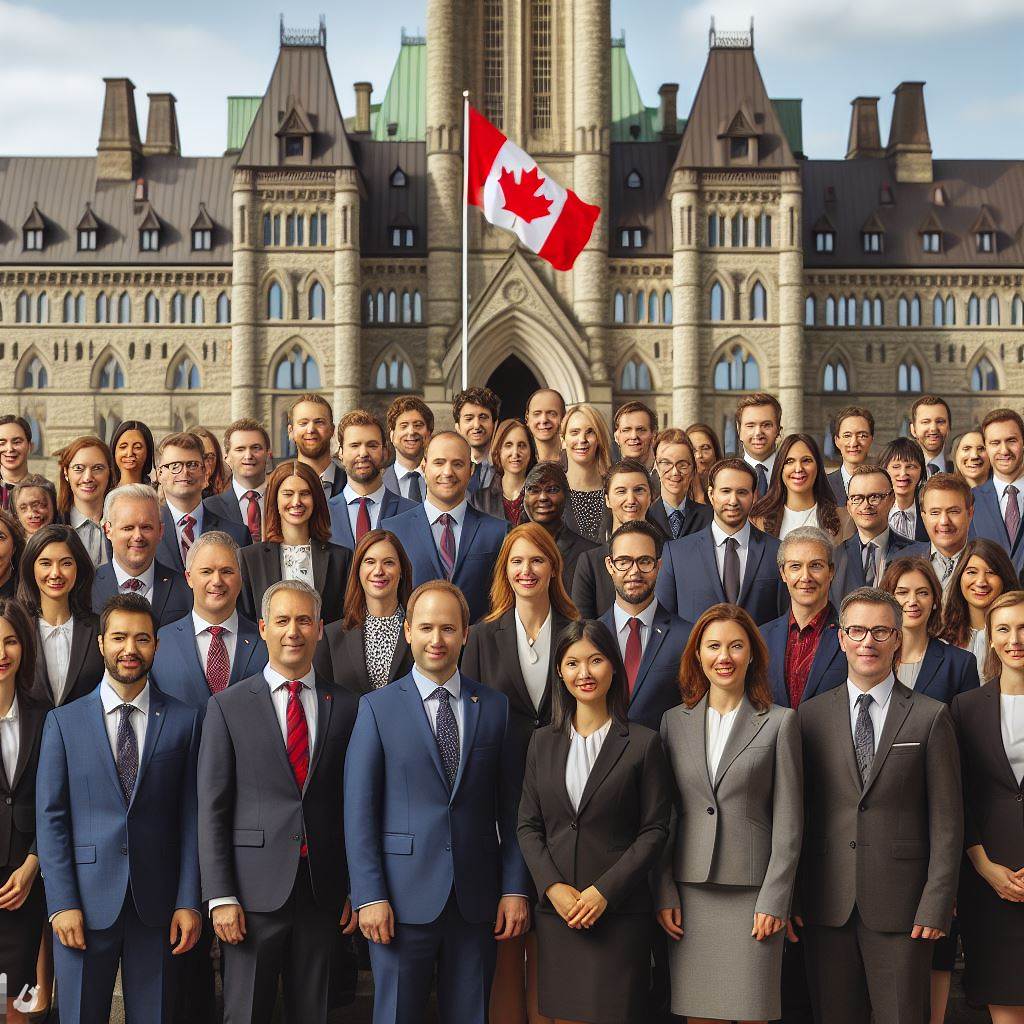Introduction
The role of public servants in Canadian government is crucial for the efficient functioning of the system.
Public servants play a vital role in providing services to the citizens of Canada and contributing to the overall development of the country.
Importance of Public Servants in Canadian Government
Public servants are responsible for implementing government policies and programs, ensuring that they are effectively carried out to benefit the citizens.
They work in various government departments, agencies, and ministries, supporting elected officials in their decision-making process.
Public servants provide essential services, such as healthcare, education, transportation, and public safety.
They work diligently to ensure that these services are accessible, efficient, and meet the needs of the Canadian population.
Furthermore, public servants play a vital role in maintaining transparency, accountability, and good governance within the government.
They provide advice, conduct research, and analyze data, assisting in the formulation of evidence-based policies.
Public servants also have a significant impact on the economy by managing public funds, ensuring fiscal responsibility, and promoting economic growth.
They work towards creating a favorable business environment and attracting investments to stimulate the economy.
Moreover, public servants act as a bridge between the government and the citizens, representing the interests of the public.
They engage with communities, stakeholders, and advocacy groups, ensuring that the government’s decisions align with the needs and aspirations of the people they serve.
In fact, public servants are crucial to the efficient functioning of the Canadian government.
Their contributions in providing services, supporting decision-making, maintaining transparency, and promoting economic growth are essential for the overall development of the country.
Definition and Responsibilities of Public Servants
Definition of public servants
- Public servants are individuals employed by the Canadian government to serve the public.
- They work in various government departments and agencies and have a duty to serve the public’s interests.
Roles and responsibilities of public servants
- Policy Development: Public servants play a crucial role in developing policies that govern various aspects of Canadian society.
- Program Implementation: They are responsible for implementing government programs and initiatives to benefit citizens.
- Service Delivery: Public servants provide essential services to the public, such as healthcare, education, and transportation.
- Regulatory Enforcement: They enforce laws and regulations to ensure public safety and compliance with government policies.
- Financial Management: Public servants handle budgeting, accounting, and financial management to ensure responsible use of public funds.
- Public Engagement: They engage with the public to gather feedback, address concerns, and encourage civic participation.
- Research and Analysis: Public servants conduct research, gather data, and analyze information to inform policy decisions.
- Advice and Consultation: They provide expert advice and consultation to government officials to assist in decision-making processes.
- Stakeholder Collaboration: Public servants collaborate with various stakeholders, including NGOs and businesses, to achieve policy goals.
- Ethics and Accountability: They uphold high standards of ethics and are accountable for their actions, ensuring transparency and integrity.
Examples of positions in the Canadian public service
- Civil Servants: These are general public servants working in various government departments and agencies.
- Foreign Service Officers: They represent Canada’s interests internationally and implement foreign policy.
- Royal Canadian Mounted Police (RCMP): RCMP officers serve as federal and provincial law enforcement officers.
- Border Services Officers: They enforce customs and immigration laws at Canada’s borders and ports of entry.
- Health Services Administrators: These public servants oversee the management and delivery of healthcare services.
- Environmental Officers: They enforce environmental regulations and promote sustainability initiatives.
- Policy Analysts: These public servants analyze policy options, conduct research, and provide policy recommendations.
- Diplomats: They represent Canada abroad, engage in international negotiations, and promote Canadian interests globally.
- Human Resources Specialists: Public servants in this role manage staffing, training, and employee relations within the government.
- Audit and Evaluation Officers: They assess government programs to ensure efficiency, effectiveness, and accountability.
In review, public servants in Canada have diverse roles and responsibilities, centred around serving the public’s interests.
From policy development to service delivery, they play a vital role in shaping and implementing government initiatives.
Collaborating with stakeholders, ensuring ethics and accountability, and engaging with the public are integral to their work.
Various positions within the Canadian public service contribute to the overall functioning of the government machinery.
Recruitment and Hiring
Process of recruiting public servants
- Government departments and agencies advertise job openings on their websites and other platforms.
- Interested candidates submit their applications, including resumes and cover letters.
- Human resources personnel review the applications to shortlist qualified candidates.
- Shortlisted candidates may be required to undergo tests, interviews, and background checks.
- After the selection process, a job offer is made to the successful candidate.
Qualifications and criteria for becoming a public servant
- Education: Most positions require a minimum level of education, such as a high school diploma or a university degree.
- Experience: Relevant work experience is often necessary and evaluated based on the position’s requirements.
- Skills: Specific skills, such as communication, problem-solving, and technical abilities, are considered essential.
- Knowledge: Public servants are expected to have knowledge of the government sector and relevant policies.
- Language Proficiency: Proficiency in English and/or French is often required due to Canada’s bilingual nature.
Importance of diversity and inclusion in the recruitment process
- Diversity: Public servants should reflect the diverse population they serve, promoting fairness and inclusivity.
- Inclusion: Inclusive recruitment practices encourage the participation and engagement of underrepresented groups.
- Representation: A diverse workforce brings different perspectives, leading to better decision-making and policy development.
- Trust-building: By representing the entire population, public servants enhance public trust in government institutions.
- Equitable access: Inclusive recruitment ensures equal opportunities for all individuals, regardless of their background.
Recruitment is pivotal, ensuring an effective and legitimate Canadian government. Public servants, the backbone, implement policies, deliver services, and make impactful decisions shaping citizens’ lives.
Departments advertise on websites and job boards. Applicants submit resumes and cover letters, detailing qualifications and experience.
Human resources review applications, shortlisting based on criteria like education, experience, skills, knowledge, and language proficiency. These qualifications ensure competence.
Shortlisted candidates undergo tests, interviews, and background checks, providing a comprehensive evaluation of suitability for the position.
Diversity and inclusion are crucial. The government values a public service reflecting citizens’ diversity, promoting fair representation and considering various perspectives in policy-making and service delivery.
Actively promoting diversity provides equitable opportunities, breaking down barriers and biases, widening the talent pool for public service positions.
A diverse workforce benefits decision-making, fostering creativity and innovation crucial for tackling societal challenges.
Unlock Your Career Potential
Visualize a clear path to success with our tailored Career Consulting service. Personalized insights in just 1-3 days.
Get StartedA public service reflecting the population builds trust in government institutions, essential for effective governance and democratic legitimacy.
In short, recruitment processes shape a qualified, diverse, and inclusive Canadian public service, representing and serving all citizens effectively.
Training and Professional Development
Ongoing training and professional development are crucial for public servants in the Canadian government.
The public service is a dynamic and ever-evolving sector, and it is important for public servants to continuously update their skills and knowledge to meet the changing needs of the government and the citizens they serve.
Continuous learning in the public service allows public servants to adapt to new policies, regulations, and technologies, enabling them to provide better services to Canadians.
There are numerous training and development opportunities available for public servants.
The Canadian government invests significant resources in providing its employees with the necessary tools and knowledge to excel in their roles.
Examples of training programs and resources available
In the dynamic landscape of Canadian governance, the Public Service Training and Development Program stands out.
Offering diverse courses, it empowers public servants with skills vital for effective administration.
The Canada School of Public Service, another cornerstone, provides online and in-person courses covering policy development, project management, and intergovernmental relations.
Beyond formal programs, public servants tap into online libraries, databases, and publications.
These resources keep them abreast of government policies, best practices, and emerging trends.
Conferences, seminars, and workshops further enrich their knowledge and foster networking.
This engagement not only benefits individual growth but enhances the government’s service delivery and policy formulation.
Investing in continuous learning forms the bedrock of a competent public service.
Well-trained individuals navigate challenges, contribute to governance, and catalyze positive change in the Canadian political landscape.
Read: Canadian Firefighters’ Salary Guide

Ethics and Accountability
Public servants play a crucial role in Canadian government, working diligently to serve the public and uphold the principles of ethics and accountability.
This chapter explores the importance of ethics in public service, the codes of conduct and professional standards for public servants, and the accountability mechanisms in place to ensure transparency and integrity.
Importance of ethics in public service
- Public servants have a duty to act ethically and in the best interest of the public they serve.
- High ethical standards build public trust and confidence in the government and its institutions.
- Ethics promote fairness, impartiality, and the proper use of taxpayer resources.
- Public servants must consistently exercise integrity and ensure decisions are free from any conflicts of interest.
- By adhering to ethical principles, public servants demonstrate their commitment to democratic values and good governance.
Codes of conduct and professional standards for public servants
- Public servants are bound by codes of conduct that outline their ethical obligations and responsibilities.
- These codes set expectations for behavior, integrity, and professionalism in the performance of public service duties.
- Public servants are required to maintain the highest standards of honesty, accountability, and respect for diversity.
- They must also comply with legal and regulatory frameworks that govern their specific roles and responsibilities.
- Professional standards ensure that public servants possess the necessary qualifications, skills, and expertise to fulfill their obligations.
Accountability mechanisms for ensuring transparency and integrity
- Transparency is crucial in maintaining public trust. Public servants must provide accurate and timely information to the public.
- They are accountable for their decisions and actions, and must be able to justify them.
- Internal mechanisms such as performance evaluations and peer reviews help enforce accountability.
- External oversight bodies, including ombudsman offices and audit institutions, provide independent assessments of public sector activities.
- Public servants are subject to legal and disciplinary measures for any violations of ethical standards or misconduct.
Canada has established various institutions and frameworks to ensure ethics and accountability in public service.
The Office of the Conflict of Interest and Ethics Commissioner oversees compliance with conflict of interest rules and provides guidance to public servants.
The Public Service Integrity Commissioner investigates disclosures of wrongdoing and protects whistleblowers.
Additionally, the Auditor General of Canada reviews government activities to ensure propriety and effectiveness.
Public servants are encouraged to participate in ongoing training and professional development to deepen their understanding of ethical standards and accountability.
By fostering a culture of ethics and accountability, Canada strengthens its public service and safeguards the democratic principles upon which it is built.
Read: Firefighter Nutrition and Diet Plans
Find Out More: Interviews with Canadian Fire Chiefs
Find Out More: Canadian Police Training: What to Expect
Importance of Collaboration between Public Servants and Other Government Stakeholders
Collaboration plays a crucial role in the effectiveness and success of the Canadian government.
Public servants need to work together with various stakeholders, including elected officials, policy-makers, and the public, to achieve positive outcomes for the country.
By actively engaging and collaborating with these entities, public servants can foster trust, enhance decision-making, and promote effective policy implementation.
Collaboration between public servants and other government stakeholders is essential because it allows for the sharing of information, expertise, and resources.
Through open lines of communication and collaboration, public servants can access valuable insights from elected officials who provide the political direction and vision for the government.
This collaboration ensures that policies and decisions align with the broader objectives and priorities of the government.
Moreover, collaboration enables public servants to work effectively with policy-makers.
By engaging in meaningful discussions and consultations, they can provide valuable input and expertise to shape policies and programs that address the needs and aspirations of Canadians.
This collaboration ensures that policies are evidence-based, realistic, and grounded in the needs of the citizens.
Interactions with the public are another crucial aspect of collaboration within the government.
Public servants must actively engage with citizens by seeking their input, addressing their concerns, and involving them in decision-making processes.
By doing so, public servants can build trust and enhance the democratic legitimacy of government actions.
The public’s input can provide unique perspectives and insights, ultimately leading to more inclusive and effective policy outcomes.
Examples of successful collaboration initiatives in Canadian government
Successful collaboration initiatives within the Canadian government serve as inspiring examples of the positive impact this approach can have.
One notable initiative is the establishment of interdepartmental working groups.
These groups bring together representatives from different government departments to address complex issues and collaboratively develop comprehensive solutions.
This collaboration allows for the efficient use of resources, prevents duplication of efforts, and ensures a holistic approach to problem-solving.
Another successful collaboration initiative is the creation of partnerships between the government and various stakeholders.
For example, public-private partnerships have proven to be effective in infrastructure development, healthcare delivery, and environmental sustainability.
By collaborating with private sector organizations, public servants can leverage their expertise, resources, and innovative approaches to deliver public services more efficiently and effectively.
Moreover, collaboration between federal, provincial, and territorial governments is crucial for national unity and cohesive governance.
Through collaborative efforts, governments can streamline regulations, share best practices, and work towards common goals.
Initiatives such as the Council of the Federation and intergovernmental councils contribute to effective policy coordination and promote collaboration across different levels of government, benefiting all Canadians.
In general, collaboration and interactions within the Canadian government are vital for its success and effectiveness.
Public servants must actively collaborate with elected officials, policy-makers, and the public to ensure informed decision-making, effective policy implementation, and inclusive governance.
By working together, stakeholders can leverage their expertise, share resources, and achieve positive outcomes that resonate with the needs and aspirations of Canadians.
Read: Retirement Plans for Canadian Firefighters
Challenges and Opportunities
Overview of challenges faced by public servants
- Increasing public scrutiny and accountability demands higher levels of transparency.
- Rapidly changing technology requires continuous adaptation and skill development.
- Bureaucratic red tape hinders agility and efficient decision-making.
- Policies and regulations frequently change, requiring constant updates and implementation.
- Shifting demographics and diverse public expectations add complexity to service delivery.
Opportunities for improvement in the public service
- Enhancing collaboration and partnerships with the private and non-profit sectors.
- Fostering innovation and embracing emerging technologies to improve service delivery.
- Promoting diversity and inclusion to ensure a representative and responsive public service.
- Investing in professional development and training programs to improve skillsets.
- Implementing performance metrics and outcome-based evaluations for increased accountability.
Trends and emerging issues affecting the role of public servants
- Digital Transformation: Public servants must embrace technology to enhance efficiency and accessibility.
- Data Privacy and Security: Protecting sensitive information in the age of cyber threats is paramount.
Public servants in the Canadian government face numerous challenges but also have opportunities for improvement.
Adapting to changing technology, demographics, and expectations is crucial.
Enhancing collaboration, investing in training, and embracing innovation are essential to meet the demands of a dynamic society.
Additionally, by addressing emerging issues such as digital transformation, data privacy, and sustainability, public servants can better serve the Canadian public, foster trust, and drive positive change.
Read: Women in Canadian Firefighting
Conclusion
Recap
Throughout this blog chapter, we have highlighted the important role that public servants play in the Canadian government. We discussed their responsibilities and contributions to society.
Importance
Public servants are integral to the smooth functioning of the Canadian government. They implement policies and provide essential services to the citizens.
Call to action
It is crucial for us to appreciate and support public servants in their diligent and demanding work.
Let us recognize their dedication and the impact they make on our daily lives.
In summary, public servants are the backbone of the Canadian government. Their commitment and expertise ensure the effective delivery of public services.
As active citizens, we should show our gratitude and support to these dedicated individuals.
Let’s acknowledge the pivotal role they play in shaping our society and contribute to a thriving nation.




